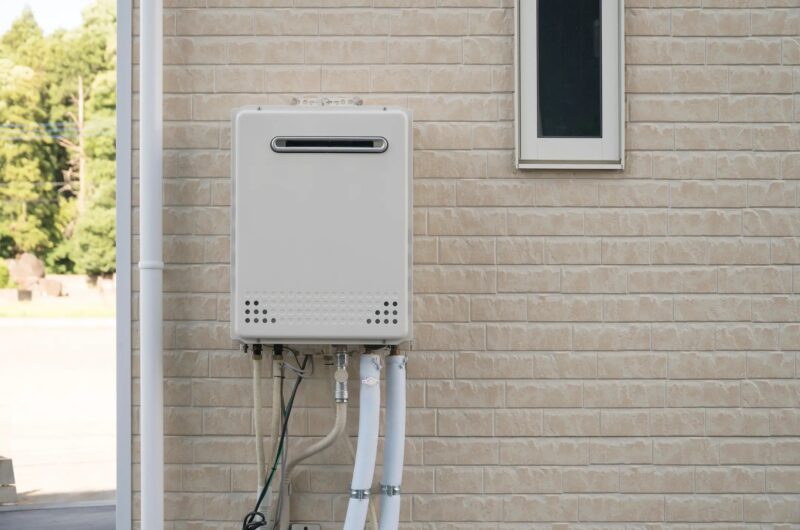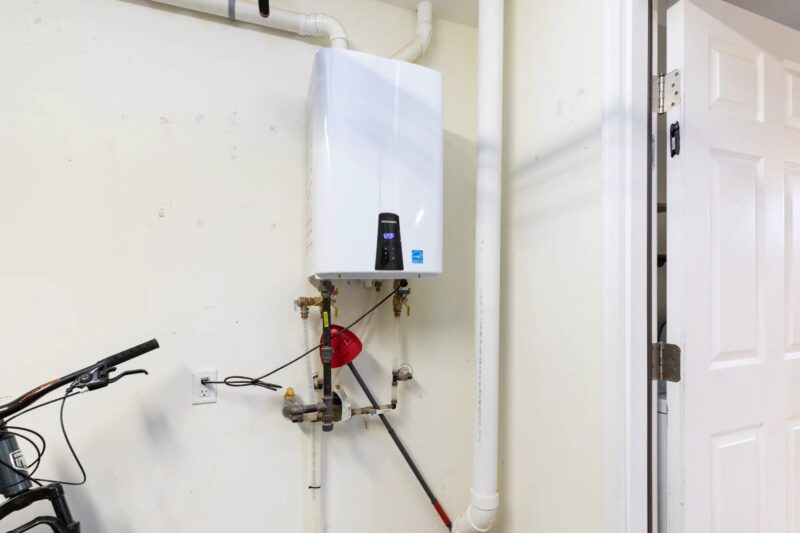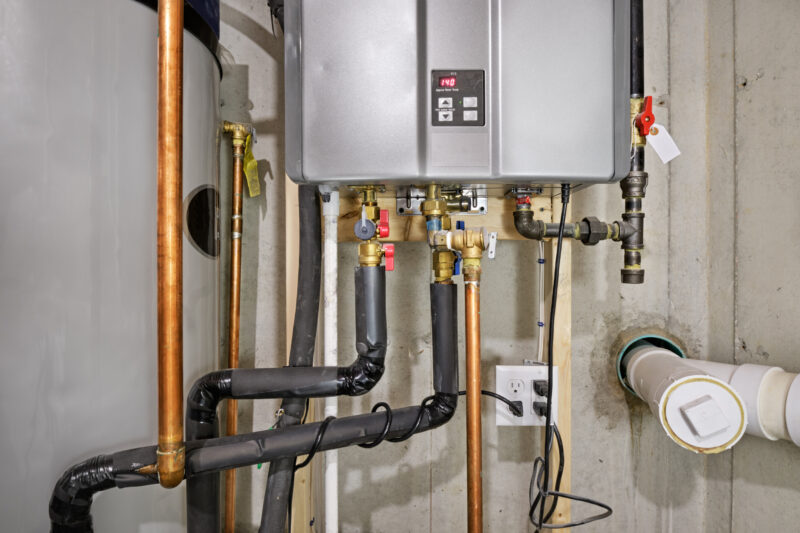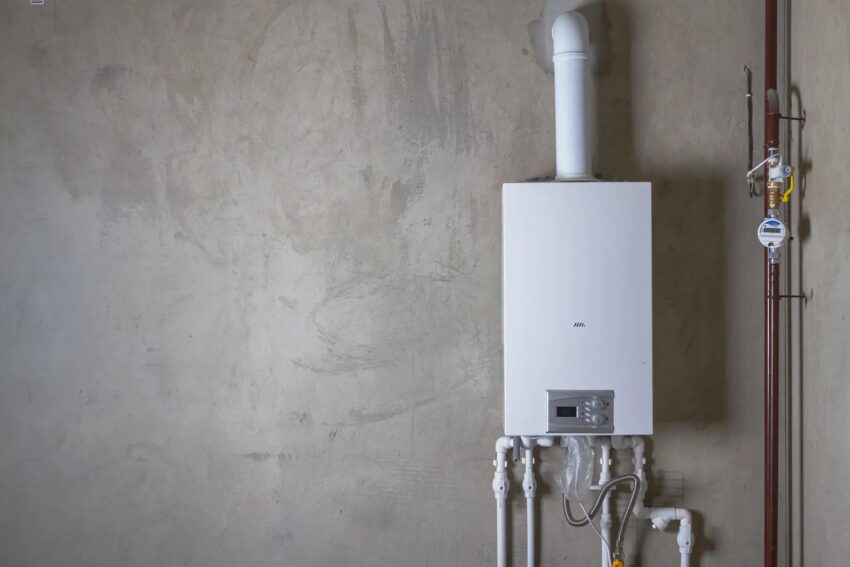Tankless water heaters cost an average of $2,500, including installation. Prices range from from $1,500 to $3,800, with smaller, single point-of-use electric models costing as low as $100 to $250. Several factors influencing tankless water heater costs must be considered when choosing the right tank for your home.
Tankless water heaters have risen in popularity in recent years thanks to their energy savings compared to traditional water heaters. Instead of keeping a tank of water hot all the time, they heat water on demand. This can save you up to 34% on your water heating costs. We’re going over everything there is to know about making the switch, including cost, installation, and tips on how to save money.
Key factors for consideration include:
- Type of system– Is it a point-of-use or a whole-house system?
- Fuel source– Choose between gas, electric, and solar.
- Installation costs– The labor costs vary depending on where you live.
- Size of the unit– Units with more heating capacity cost more.
Factors in Calculating Tankless Water Heater Cost

Several types of tankless water heaters are available, so you must do some research when you’re choosing the right one for your home. Several factors influence the cost of a tankless water heater.
Size and Heating Capacity
Tankless water heaters are available in many sizes, rated in gallons per minute (GPM) and temperature rise. The size you need will depend on the flow rate required by your household.
Single-Point or Whole-House Systems
Whole-house tankless water systems supply hot water to your entire house and produce up to 10 gallons of hot water per minute. These units cost $200 to $2,300 depending on the fuel source, size, brand, and energy efficiency ratings.
Single-point tankless water heaters, or point-of-use systems, are designed to supply hot water to one location, with a maximum run of 50 feet. Each unit costs less, usually $100 to $300 each, but you’ll need multiple units.
Brand and Manufacturer Differences
As with any appliance, there are several brands of tankless water heaters to choose from. Well-known brand names usually cost more but may be worth it in the long run.
Energy Efficiency Ratings
Tankless water heaters are either condensing or non-condensing units. Condensing units that capture heat before it escapes into the venting system are more efficient.
Appliances with higher energy efficiency ratings cost more, but the energy savings can pay for themselves quickly.
Installation Complexity
The more complex the installation is, the more it will cost you to install a tankless water heater. The number of units you need, the type of fuel source, extra plumbing, and any structural modifications all add to the overall cost of tankless water heater installation.
Additional Costs and Considerations
Installing a tankless water heater may require other work to be done, resulting in additional costs.
Potential Electrical Upgrades
Depending on the size and type of system you choose, you may need to add electrical circuits to various parts of your home. Consider the cost of potential electrical upgrades when choosing the best tankless water heater for your home.
Required Venting Systems
Gas-powered tankless water heaters require venting, which adds to the cost of installation. Natural gas and propane tankless water heaters need special venting that blows the exhaust outside, so your home could need structural modifications.
Maintenance and Warranty Options
Electric tankless water heaters typically have a 5 to 10-year warranty. Gas unit warranties are typically longer, up to 15 years.
Tankless water heaters need to be annually serviced to avoid premature failure. You may also have to pay technicians to replace blown fuses, restart pilot lights, and replace broken thermostats.
Local Building Code Compliance
Plumbing codes for tankless water heaters vary depending on where you live. You may have to obtain permits or retrofit parts of your home to ensure that your tankless water heater is installed according to building codes.
Types of Tankless Water Heaters and Their Costs

The two most popular tankless water heaters are electric and gas. Explore each type’s costs, price ranges, and installation considerations, and learn basic facts about hybrid and solar tankless water heaters.
Electric Tankless Water Heaters
Electric tankless water heaters are typically the least expensive type and require fewer installation modifications.
Price Range
Electric tankless water heaters cost $300 to $1,000 and another $300 to $1,500 for installation. Operating costs are about $25 to $45 per month or $300 to $540 per year.
Suitable Usage Scenarios
If your home doesn’t have natural gas or propane plumbing, an electric tankless water heater is the best choice. They are less expensive to purchase and install, so if you’re working with a tight budget, they are a better option.
Gas Tankless Water Heaters
Gas tankless water heaters can be fueled by propane or natural gas. They are more expensive to purchase and install but have lower operating costs than electric units.
Price Range
Propane and natural gas tankless water heaters cost $400 to $2,100 and another $300 to $2,500 for installation. Operating costs are about $15 to $25 per month or $150 to $300 per year.
Ventilation Needs
Gas venting systems typically cost $100 to $600. Gas tankless water heaters must also be placed on an outside wall, so you may have to pay more for structural modifications and plumbing upgrades.
Hybrid Tankless Water Heaters
Hybrid water heaters use heat pump technology to heat water, and they are a more energy-efficient alternative to traditional water heaters. This type of water heater costs $1,200 to $2,500, not including installation.
Solar Tankless Water Heaters
Another option is a solar tankless water heater. They typically operate with a gas or electric backup. Solar tankless water heaters cost about $1,700 to $5,500. Most homeowners see a 100% return on their investment within a few years.
Other Costs of Installing Tankless Water Heaters
With any type of tankless water heater, you may need to pay additional costs, including the following:
- Bring plumbing up to code- $100 to $500
- Permits- $25 to $200
- Water tank removal- $75 to $500
- New electrical outlets or circuits- $150 to $300
Benefits of a Tankless Water Heater

Is it worth it to get a tankless water heater? Consider the following benefits to help you decide.
Continuous Supply of Hot Water
If you’ve ever run out of hot water mid-shower, you will appreciate the continuous supply of hot water provided by tankless water heaters.
As long as your hot water system is rated for the peak demand of your home, you’ll enjoy plentiful hot water because it’s constantly being produced when and where it’s needed.
Energy Efficiency and Lower Bills
It’s much more efficient to heat small amounts of water as it’s being used than to heat a large amount of water and keep it hot 24 hours a day.
According to Energy Star estimates, most households can save hundreds of dollars a year by installing tankless hot water systems. They generally cut energy usage by 27% to 50% compared to traditional water heaters.
Compact Design and Space Saving
Tankless water heaters have a compact design that saves space, which is important in smaller homes. Even in a large home, you can use the extra space you save and convert it to a closet.
Extended Lifespan
Replacement costs should be factored into your decision when choosing a water heater for your home. Standard water heaters last about 8 to 12 years, and tankless water heaters have a lifespan of about 15 to 20 years, almost twice as long.
What Size Tankless Water Heater Do You Need?

Several factors must be considered when determining what size tankless water heater you need for your home. Learn how to calculate your home’s hot water demand to determine the best size water heater for your needs.
Evaluating Your Home’s Water Demand
To ensure you get the right size tankless water heater, calculate your home’s water demand. Here are some common appliances that use hot water and the flow rate required by each.
| Fixture | Gallons per minute |
| Kitchen sink | 1.0 to 2.2 |
| Bathroom sink | 0.5 to 2.2 |
| Shower | 1.5 to 3.0 |
| Tub | 3.0 to 6.0 |
| Dishwasher | 1.5 to 3.0 |
| Washing machine | 2.0 to 3.0 |
Peak Usage Considerations
If any of the appliances listed above run simultaneously in your home, you’ll need to add their flow rates together to find the peak hot water demand for your household.
The more people in your household, the higher your peak usage will be. In some cases, it will pay to have additional single-point tankless water heaters in your second or third bathrooms to handle the peak water demands.
Climate and Incoming Water Temperature
It’s also important to factor in the groundwater temperature in your climate region. Homeowners in northern climates need to account for a higher temperature rise, so should select a tankless water heater with a higher peak water demand.
Costs and Risk of DIY Installation vs. Hiring a Professional

Can you DIY install a tankless water heater? If you have the skills, you may be able to do part of the work, but making gas connections and changing electrical wiring typically requires a licensed professional.
DIY: Potential Savings and Pitfalls
Although you may be able to save money DIYing a tankless water heater installation, it requires extensive skills, and you could damage your home or cause personal injury by installing it improperly.
Professional Installation: Expertise and Warranty
Most warranties for tankless water heaters are void unless they are installed by a professional. Hiring a professional will ensure that your installation is safe, and you won’t have to worry about premature failure of your water heater.
How to Save Money on a Tankless Water Heater
Here are a few money-saving tips to consider when buying a tankless water heater:
- Tax credits and rebates– Many gas tankless water heaters qualify for tax rebates.
- Seasonal promotions and discounts– Shop around and take advantage of seasonal promotions to save money on tankless water heater installations.
- Energy savings over time– Factor in the increased efficiency of certain types of tankless water heaters to take advantage of energy savings over time.
- Regular maintenance for extended efficiency– most experts recommend annual maintenance to prolong the life of your tankless water heater.
Weighing the Investment in a Tankless Water Heater
Tankless water heaters are an investment, and they will pay for themselves over time. However, they have a high upfront cost and may require structural modifications or plumbing upgrades.
Before deciding if a tankless water heater is worth it, calculate your household’s hot water demands, and then contact a professional installer for a quote.
Frequently Asked Questions About Tankless Water Heaters
How long does a tankless water heater typically last?
Tankless water heaters last about 15 to 20 years, on average. Electric tankless water heaters are usually under warranty for 5 to 10 years, and gas units are often protected for up to 15 years.
Is there a significant difference in savings between electric and gas tankless heaters?
Natural gas tankless water heaters are the least expensive to operate, but electric units are typically cheaper to purchase and install.
How often do I need maintenance on my tankless system?
Most professionals recommend annual or semi-annual maintenance on your tankless water heater. Flushing once per year can extend the lifespan, and in areas with hard water, you may need to flush your tank every 6 to 9 months.
Can a tankless heater serve an entire household?
A tankless water heater can serve an entire household, but if your home is large and the water lines are long, you may need another unit to serve a large household.
Are there any drawbacks to going tankless?
The two main drawbacks of tankless water heaters are the upfront costs, which are higher than traditional water heaters, and inconsistent temperatures. By choosing a unit that’s rated for your home’s water demand, you can avoid problems with fluctuating water temperatures. In the long run, your tankless water heater will pay for itself in reduced replacement costs and energy savings.



